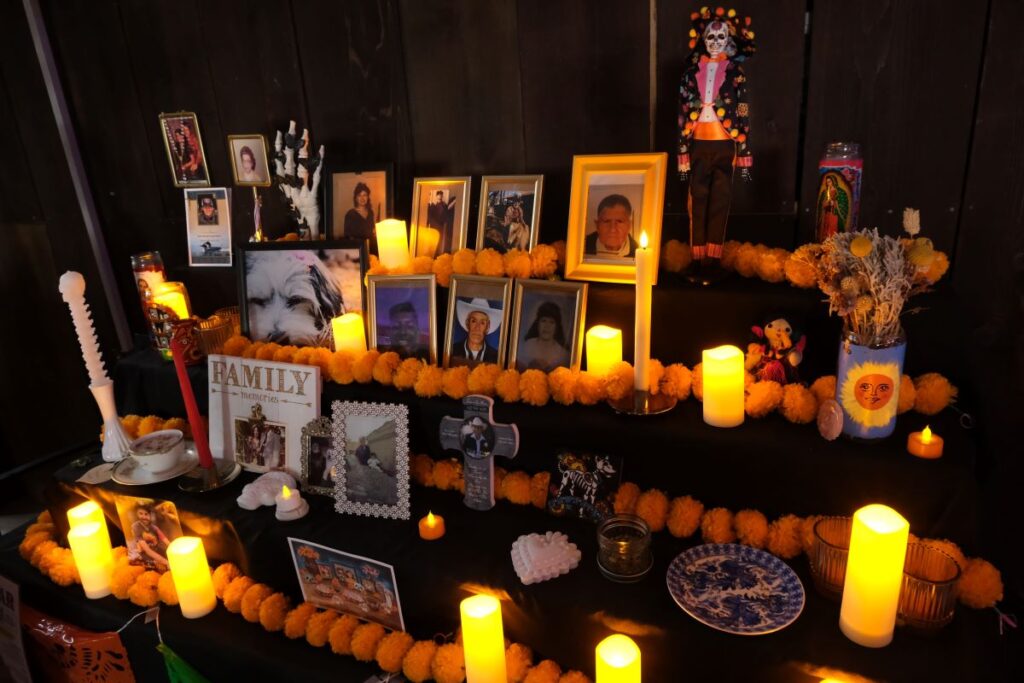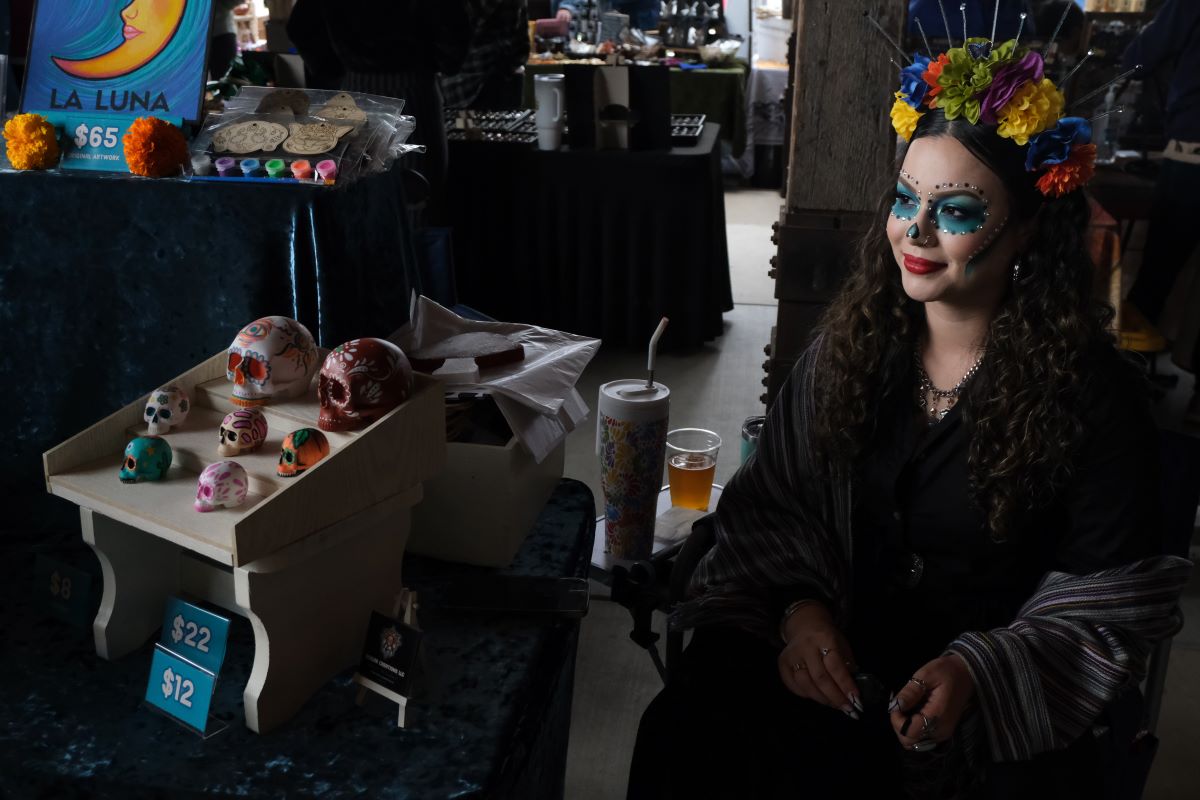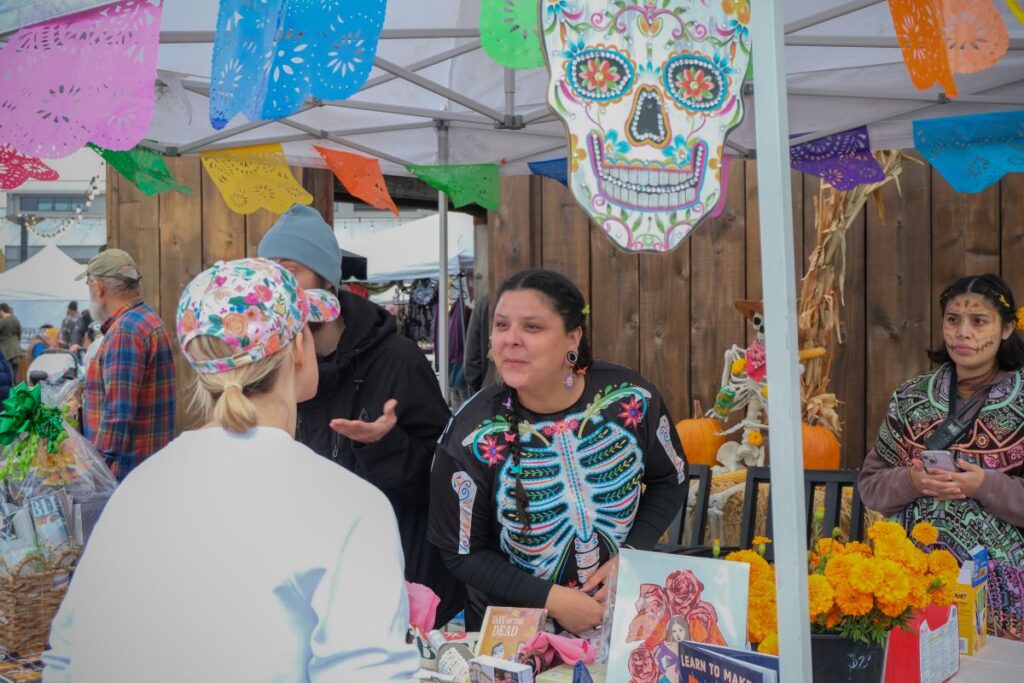CHICO, California — When I joined the crowd at The Barn at Meriam Park for a Nov. 2 celebration of Day of the Dead — a Mexican tradition called Día de los Muertos in Spanish — I didn’t expect it to lead me to reconsideration of a Chinese festival, Tomb Sweeping Day, that was part of my own childhood.
Latin music played loudly in the background. On stage, children whose faces were painted like skeletons danced and sang joyfully. Next to the stage stood a community altar, adorned with photos of deceased loved ones, candles, and marigolds — the flower that is believed to guide spirits back home.
Nearby, a table offered marigold-shaped stickers where attendees could write the names of their departed loved ones as well as messages for them.
‘I Miss You’
I wrote down my grandfathers’ names and the words, “I miss you.” They have both passed away, one in 2016, the other in 2022.
My paternal grandpa’s name is Yongchao, meaning “permanent wave” in Mandarin. When I was in primary school, I liked to pretend that I was a teacher and I was teaching Yongchao how to write journals and recite poems. Yongchao always cooperated with me, spending hours listening to my class attentively and finishing the homework I assigned.

My maternal grandpa’s name is Huanhua, which means “brighten China.” He was a dancer, and people always said I inherited his artistic talent. Years of dance training gave him perfect posture — he always stood upright and couldn’t resist dancing whenever music played.
Thinking of them brought tears to my eyes, but my sadness was soon interrupted by the lively music, performances, and the beautifully decorated skulls surrounding me. Skulls, often considered terrifying in China, had become a symbol of death and rebirth here. I even bought a sugar skull that can be painted with edible paint and a small brush.
I could not help but think about a similar festival back in my hometown across the Pacific: Tomb Sweeping Day.
Tomb Sweeping Day
In China, everyone returns to their hometown in early April to honor their deceased relatives and ancestors. Family members visit the graves in the springtime, clean the tombs, make food offerings and remember the deceased.
After learning about Day of the Dead, I was surprised by how similar the two festivals are. Just as people celebrating Day of the Dead will leave the favorite dishes of their late loved ones out, we place chopsticks, plates and bowls filled with food and alcohol in front of the tombs. The belief is that our loved ones will return to enjoy the offerings.
My grandmother would mutter a series of prayers, asking them to bless our family with luck and fortune. The atmosphere was always serious and solemn. Sometimes, a mischievous child, unaware of the rules, would sneak food from the plate while my grandmother was still praying. This was considered a disrespect to ancestors, and the child would be sternly scolded, withdrawing their small, guilty hands.
Burning Paper Money
We would keep refilling the plates and cups, assuming our ancestors were consuming the offerings. To avoid overflowing the cups, we would pour only a little alcohol at first, saving room for more. As a child, I always found this scene funny and even ridiculous, not understanding the spiritual significance.
My memories of Tomb Sweeping Day are mostly shrouded in sadness, under dark skies and constant rain. Chinese poetry often captures this melancholy. One famous poem, recited by nearly every Chinese person, goes: “A drizzling rain falls on Tomb Sweeping Day; the travelers on the road look like lost souls.” The poem sounds even more depressing in Mandarin.
We burned “paper money” – the beige papers that represent the currency our ancestors need in the afterlife – and hoped our departed relatives would have enough money to spend there. I didn’t like this part; the black smoke smelled bad, stung my eyes, and caused them to water. The world around me felt like it was caught in a vast, dark whirlpool.
Symbiosis of Cultures
Justina Sotelo, a vendor I met at the event, painted an orange monarch butterfly – the “butterfly of immigration” – on her face, and wore wings on her back.
“There is sadness about Day of the Dead,” she said. “But that’s not the focal point. The idea is that there is a celebration, there’s this acknowledgment of death, there’s this recognition of death.”
Celebration? I never thought of Tomb Sweeping Day in those terms. I never thought it could be as joyful as Day of the Dead. But as I reflected and pushed myself to ponder on it after hearing what Sotelo said, I recalled moments of laughter and joy from our festivities.
Qingtuan and Snails
As an only child, I often felt lonely while growing up, but during the festival, I looked forward to spending time with my cousins. My great-grandparents’ tombs were on a small mountain near a creek. After paying our respects, the whole family would gather by the creek, set up a grill, and barbecue. Adults prepared food, children splashed in the cool water. The adults would gossip and share stories, some of them about the deceased and some about the living. The air was filled with chatter, laughter, and the aroma of delicious food.
The dishes we brought were always special. Qingtuan, a jade-colored Chinese dumpling made of glutinous rice mixed with Chinese mugwort, was a must-have. It usually has two flavors, sweet and savory. I was a big fan of sweet Qingtuan, whose filling is made of red beans, but gradually became more into the savory version as I grew up.
Stir-fried snails were another staple. Family members would often debate whose recipe was best, and the winner would be tasked with cooking them the following year. My youngest aunt was always the winner, and apparently, she was proud of that.
Moving Forward
I wondered: Isn’t cherishing time with loved ones and enjoying delicious food a form of celebration? I think one of my grandfather’s wishes would have been to see his family happy, even after his passing.
“There’s a normalcy in recognizing they’re gone but still with us,” Sotelo had told me. “It helps us understand death and how loved ones live on through our practices, stories, and memories.”
Her words resonated with me. After our loved ones pass away, we must move forward, but we also need to carry them with us in our heart or memories; it’s a journey of internalization. It’s a process, with the tension between forgetting and remembering.
I would not say the Day of the Dead changed my attitude toward death, but its seemingly exaggerated forms of celebration provided me with an opportunity to rediscover Tomb Sweeping Day, a tradition that I belong to and is deeply rooted in my heritage.
Joy and Celebration
For example, adding alcohol to a cup no one drinks from isn’t ridiculous anymore — it’s a tradition, practice and story that helps us feel connected to those we’ve lost. For example, Tomb Sweeping Day wasn’t all about heavy sadness; there was joy and celebration, too.
Perhaps I never truly understood the essence of the festival as a child. Perhaps I’m only recently beginning to grasp what it means to grieve and honor the past.
Honoring My Grandfathers
Before leaving the Barn, another vendor, Justin Stier, said that when he came to Chico 20 years ago, there were not many people outside the Spanish-speaking community celebrating Day of the Dead, but it has become more and more popular. I guess it might take more time and a larger community to make Tomb Sweeping Day more popular and well-known on this continent.
The marigold-shaped sticker I wrote on during the event now sits in the corner of my work desk. As I gaze at the gray sky outside my apartment window, I wonder: Does that other world also have national borders and cultural divisions? Guided by the marigold, could my Chinese grandfathers, Yongchao and Huanhua, find their way to my new home in California — a place they never could have imagined — to visit me?
I miss them.
Yucheng Tang is a California Local News Fellow reporting for ChicoSol. Growing up, Yucheng spent much of his time with his grandparents in China and says Chico reminds him of his hometown.





